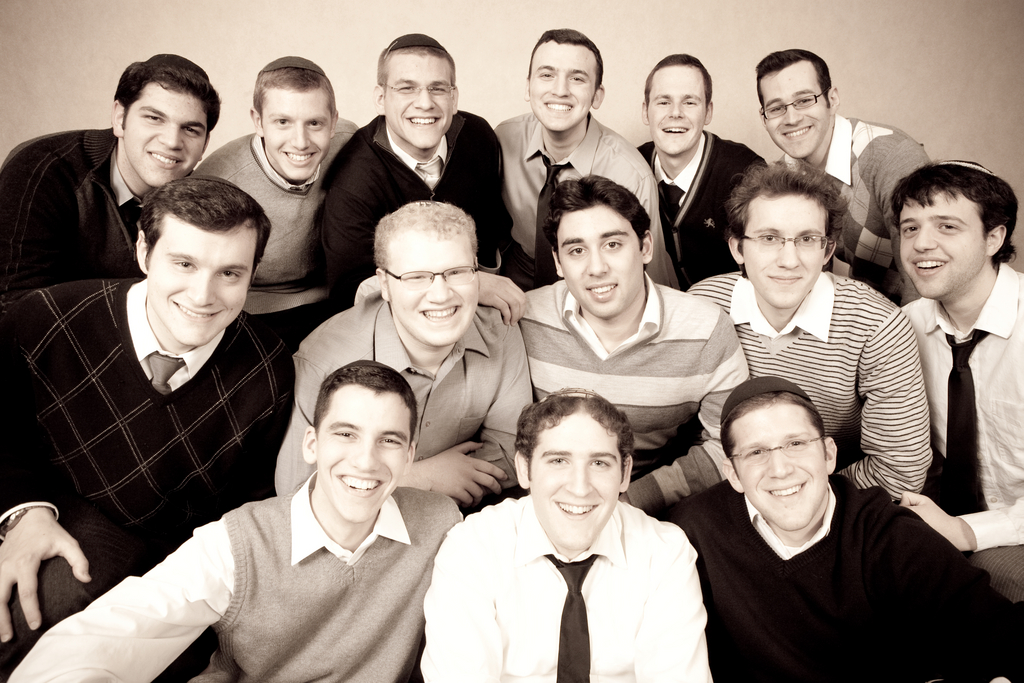Review: Maccabeats, and the latest from A.K.A. Pella
By Mayer Fertig
Issue of April 16, 2010/ 2 Iyur 5770 In a Jewish world where the letter of the law is rarely enough anymore (why stop at one letter when you can have the whole aleph beis?) a Capella is a delightful exercise in strict observance. No music during the Omer, between Pesach and Shavuot? No problem. We'll just sing. Well, technically, we might sing into a computer and with great sophistication manipulate the voices to mimic instruments, but really, it's still just singing.New Capella albums - four of them - are in stores now, their arrival timed to the Omer. Recently launched Chassidic singer Beri Webber has one; another is called Heimeshe Oitzros; and Sameach Music has two that are the subject of this review. A.K.A. Pella's fourth album is called Platinum; and the Maccabeats, Yeshiva University's first a capella group, or at least the first one to make it this far, released Voices from the Heights. Washington Heights, that is. It includes a solo turn for YU President Richard Joel.
Both are well worth listening to but for different reasons on account of their very different styles.
The Maccabeats, 14 young men led by Julian Horowitz of Brooklyn, a bass, and Immanuel Shalev of Lawrence, also a bass, have a more old school sound. Their rich harmonies are accompanied by "beat-boxing" - vocal percussion provided by baritone Meir Shapiro of Passaic.
"There's very little that we can't do live," said Shalev, 23, now a first year student at Fordham Law. "Most of the production was cleaning up beat-boxing and a soloist singing with himself," he said.
The 12 tracks are a mix of covers of contemporary Jewish music, a few classics, and several secular songs.
The group's origins were modest.
"That first year we were kind of a nerdy a Capella group, singing at the arts festival," Shalev recalled. "It took until our second year for people to begin to" he paused, "like us." The Maccabeats performed at the YU graduation at Madison Square Garden last June.
The other members of the group are Yonatan Shefa, a tenor from East Windsor, NJ, the only other alumnus besides Shalev; the group's founder, Michael Greenberg, a baritone from Queens; Tenor Noah Jacobson from Houston, TX; Tenor David Block of West Hempstead; Tenors Mordy Prus and Chanina Abramowitz, both of Brooklyn; Tenor Yona Saperstein of Lawrence; Buri Rosenberg, a bass, from Monsey; Josh Jay, a baritone from Paramus, NJ; Jeffrey Ritholtz, a tenor from Merrick; and Tenor Ari Lewis, of Richmond, VA.
Yeshiva's president, Richard Joel appears on track 8, called Shaleshudis Medley.
"We kind of insisted on it," Shalev said. "We performed once at a Shabbaton at Stern and he was the chazzan...we liked his voice, so we thought we would ask him. He kind of went along with it, but he was humble. He said, 'I have a cold,' but we pushed him and he did it. He sounds great."
The disk, released on March 23, was recorded on campus at the Belz School of Music. It's available in Judaica stores and on iTunes. The group's web site is www.maccabeats.com. For fans of Jewish a Capella, the Maccabeats' Voices from the Heights comes highly recommended.
A.K.A. Pella offers a different kind of sound, entirely. Like the Maccabeats, the album jacket certifies that, 'no musical instruments were used in the making of this album.' It's just that on first listen that can be a little bit hard to believe.
On track after track, the rich vocal harmonies are backed by complex drumming and percussion, keyboards, guitars, horns and bass - or at least it sounds that way, earning the group it's tongue-in-cheek tagline, 'So good it should be assur.'
The group's signature technique of heavily manipulating the human voice using studio technology was new to Jewish music when A.K.A. Pella introduced it several years ago on the first of their four albums, but it's been known for years on college campuses where a capella is hugely popular.
Despite its technical complexity, the group's producer, C.D. (Chaim Dovid) Eichler, a 31-year-old advertising executive from Monsey, said most of the music could be performed and recorded live, "but we are literally arba kanfos Haaretz," from the four corners of the Earth. "One guy lives in Israel," he said, referring to Rabbi Elie Ganz, a rabbi. As a result, the album was recorded piecemeal in a variety of studios, using all sorts of technology.
A.K.A. Pella's music is an unabashed mash-up of Jewish and secular music, all fully credited on the cover.
"Each guy in the group brings a certain element," Eichler explained. "All are professional chazzanim who get paid a lot of money to daven on Yomim Nora'im, and are 'beki'im' (experts) in all types of music. They know everything from the Supremes to Pink Floyd. These are nice Jewish boys who just happen to have a encyclopedic knowledge of music," he said.
The 14 tracks were chosen as representing the very best that Jewish music had to offer in the last two years or so. A number of runners-up are named in the liner notes.
Eichler has known the other six members of the group for years, Ganz and Yoel Horowitz from a yeshiva in Scranton, PA; and Dovi Ziffer, Zevi Daniel, Elchonon Majewski and Avi Stewart from Baltimore's Yeshiva Ner Israel.
Horowitz lives in New York and is attending YU's Wurzweiler School of Social Work; Ziffer is a business consultant in Baltimore; Daniel, also from Baltimore, works in marketing; Majewski is a speech therapist in Brooklyn; Stewart is a kiruv professional in Los Angeles.
A.K.A. Pella works its magic using a time consuming four-step process, Eichler explained. "I like to think of it as a sandwich," he said. Background vocals are recorded first, mostly sung as chords. Lead vocals go next, "clean, crisp vocals sung as solos." Then a level of effects like reverb are added, and background vocals are "processed and tweaked." Then, more effects.
"I think the art in the project is all in the details," Eichler said. He spent a month trying to find someone with a distinctive voice just like the late actor Vincent Price, who appeared on Michael Jackson's song, Thriller, which A.K.A. Pella borrowed from in track 10, Greatest Medley Ever. In the end Eichler recorded the part himself, on an iPhone, while sick at home with a virus that, providentially, deepened his voice significantly.
"It was siyata d'shmaya. I couldn't understand why I came down with a virus before I had to record vocals," he said. Then, Dave Rosario, a production engineer, had a surprise. He was able to "get a hold of the Michael Jackson session with Vincent Price and isolate his voice, and replicate the tonal frequencies" and apply that to Eichler's voice.
"By using the exact same tonal frequencies and reverb, even though my voice is nothing near Vincent Price's, the result is extraordinary," he said, proudly.
"I get very turned off when people talk about computers. Even the computer part of it," he said. "There's so much thought to effects. The panning. And even the vocal sampling that you use. Everything starts off as a vocal. And everything is there as enhancing or an accoutrement to the song."
The album took two years to produce.
"Take Lady Gaga, Bad Romance, and Aahron Razel, B'Inyan Hasimcha - songs with widely different tempos," he explained. "Many people don't recognize the technical artistry that goes into mixing those. One is the ikkur (the important part) and one is the toful (the less important part) and you want to make sure that the meat and potatoes doesn't get lost when you're combining them. One can sound good and one can fall flat on its face. We can spend hours on the beat and hours on the key - that's just an example of the incredibly detailed preproduction that goes into each track."
Eichler defends the group's use of secular music.
"Music has a tremendous koach (power). If you're going to take a song that your daughter or your son is going to dance to, I would like to take that koach and channel it," he said "I would like to use it for a higher purpose."

 51.0°,
Overcast
51.0°,
Overcast 









